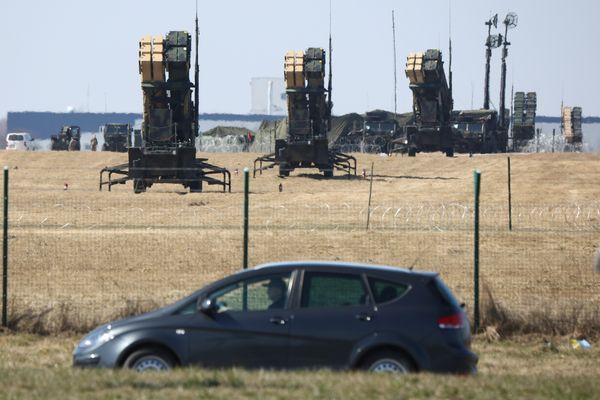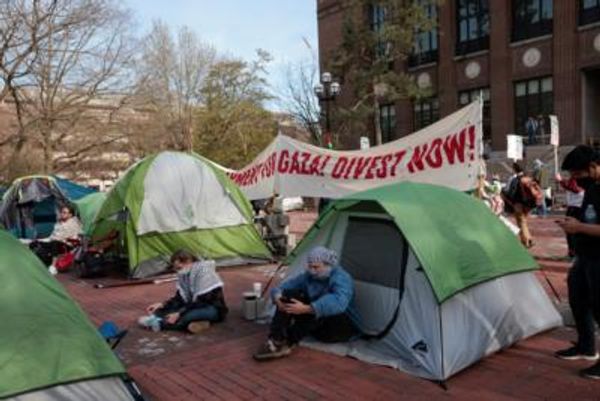
Four days after Wagner group mercenaries marched on Moscow, a Russian envoy flew into Benghazi to meet a worried warlord. The message from the Kremlin to Khalifa Haftar, the self-styled general who runs much of eastern Libya, was reassuring: the more than 2,000 Wagner fighters, technicians, political operatives and administrators in the country would be staying.
“There will be no problem here. There may be some changes at the top but the mechanism will stay the same: the people on the ground, the money men in Dubai, the contacts, and the resources committed to Libya,” the envoy told Haftar in his fortified palatial residence. “Don’t worry, we aren’t going anywhere.”
The conversation, relayed to the Guardian by a senior Libyan former official with direct knowledge of the encounter, underlines the degree to which the Wagner group’s deployments and its extensive network of businesses across Africa is yet to be hit by the fallout from the rebellion of its founder and commander, Yevgeny Prigozhin.
The resilience of Wagner’s commercial operations despite the turmoil in Russia strongly suggests Vladimir Putin’s regime will seek to appropriate and exploit the lucrative web of hundreds of companies that Prigozhin built, rather than shut it down, experts believe.
In Libya, there has been no abnormal movement of Wagner personnel, other than the redeployment of a small detachment of 50 closer to the border with Sudan.
The situation is similar elsewhere in the continent, according to sources in half a dozen African countries with knowledge of its operations.
“For the moment, it looks like Wagner’s operations are on hold. But they are successful and not so expensive, so it is very likely Wagner will be rebranded [by Moscow] while maintaining most of its assets and systems,” said Nathalia Dukhan, the author of a recent report on Wagner’s operations in Central African Republic (CAR) published by The Sentry, a US-based investigative organisation. “It is like a virus that spreads. They do not appear to be planning to leave. They are planning to continue.”
Though attention has mainly focused on Wagner’s combat role, particularly in Ukraine in recent months, analysts and western intelligence officials say that in Africa it is the group’s economic and political activities that are important to Putin’s regime.
“Since its first deployments in 2017, Wagner has really become much more widespread and high profile. Now the Kremlin certainly seems to be trying to emphasise continuity, if not immediate expansion,” said Julia Stanyard, an expert on Wagner at the Global Initiative Against Transnational Organized Crime.
Sergei Lavrov, the Russian foreign minister, last week reassured allies in Africa that Wagner group fighters deployed to the continent would not be withdrawn. In an interview with Russia Today, Lavrov promised that “instructors” and “private military contractors” would remain in CAR and Mali, the two countries in sub-Saharan Africa where Wagner has the biggest presence.

The most developed commercial operation run by Wagner is in CAR, where the group’s mercenaries arrived in 2018 to bolster the regime of President Faustin-Archange Touadéra, which was struggling to fight off a rebel offensive.
From multiple bases in and around Bangui, CAR’s capital, Wagner has run an extensive mining operation across the country. The group has also begun making and selling beer and spirits, and has been granted a hugely profitable concession to exploit rainforests in the south of CAR.
The biggest single project is the vast Ndassima goldmine, which has been taken over by Wagner and is being developed. Poor infrastructure is thought to have restricted output at Ndassima, however, forcing Wagner to seek profits through the takeover of smaller mines along CAR’s remote eastern frontier region. Last year, Wagner fighters launched raids on goldmines there that killed dozens of people, witnesses interviewed by the Guardian said.
These operations are thought to be the primary responsibility of a small detachment of Wagner fighters, which also oversees the smuggling of gold and much else into Sudan, where the Wagner group has close contacts with the Rapid Support Forces (RSF) of Mohamed Hamdan Dagalo currently fighting for control of the state.
Last month the US Treasury imposed a new round of sanctions that aimed to “disrupt key actors in the Wagner group’s financial network and international structure”.
Three companies were targeted, all involved in Africa. One was Midas Ressources, a CAR-based mining company linked to Prigozhin, which the US Treasury said “maintains ownership of CAR-based mining concessions and licenses for prospecting and extracting minerals, precious and semi-precious metals, and gems”, including the Ndassima mine.

A second company targeted was Diamville, described by the Treasury as “a gold and diamond purchasing company based in the CAR and controlled by Prigozhin”, which the US alleges shipped diamonds mined in the CAR to buyers in the UAE and in Europe, using a third company under sanctions called Industrial Resources.
Experts have said diamonds would be useful for evading sanctions imposed on Russia after its invasion of Ukraine. “You can buy any goods anywhere with diamonds,” Dukhan, the analyst, said.
An earlier round of US and EU sanctions targeted Wagner’s holdings in Sudan, in particular a company called Meroe Gold. Recent EU sanctions listed further companies alleged to be “illegally trading gold and diamonds looted by force from local traders”.
Until fighting between rival factions in Sudan broke out in April, Wagner operatives ran an office near the airport in the capital, Khartoum, with bullion flown out from an airbase a short distance away in the desert, local officials and diplomats told the Guardian last year. Bullion is sent to the United Arab Emirates and Moscow for sale on to international markets.
The conflict in Sudan is thought to have constrained – but not entirely halted – Wagner’s extensive operations there, which are focused on gold mining and refining in collaboration with the paramilitary RSF.
The small Wagner detachment in Sudan has also had sporadic contacts in recent months with RSF, and may have supplied them with weapons, according to local sources, but has otherwise stayed away from significant involvement in the fighting.
“The priority is basically to keep the gold moving,” said one western security source who was recently forced to leave Khartoum by the fighting.
Last weekend, observers with multiple sources on the ground in CAR said there had been no evidence of movement of Wagner personnel on any of the poverty-hit country’s few major roads, nor at its principal airport.
On the Sudanese frontier, it was “business as usual”, according to Enrica Picco, central Africa director of the International Crisis Group.

In Mali, where Wagner’s commercial operation is less well-developed, the group is thought to have struggled to make significant profits since deploying in December 2021. Diplomatic sources told the Guardian that Wagner had experienced difficulty accessing the goldmines they were allowed to exploit under the deal struck with the regime of military ruler Assimi Goïta but had been paid handsomely by the military regime.
The US believes Mali’s transition government has paid more than $200m (£157m) to Wagner since late 2021, the White House national security spokesperson, John Kirby, told reporters last week.
Political dividends have also been significant. Last week, the UN security council voted to withdraw its peacekeeping mission in Mali after a decade, allowing the country to swing further under the influence of Moscow. Earlier this month, Mali had asked the UN peacekeeping force to leave “without delay”, citing a “crisis of confidence” between Malian authorities and the UN mission.
Kirby said Prigozhin had helped engineer the UN’s departure “to further Wagner’s interests. We know that senior Malian officials worked directly with Prigozhin employees to inform the UN secretary general that Mali had revoked consent for the [UN] mission,” he said.
Local sources in Mali said a routine rotation of Wagner staff had been completed without incident in the days after the mutiny and mercenaries had continued operations with Malian forces fighting insurgents across the centre and north of the country.
In Libya, another sizeable contingent of Wagner mercenaries is deployed in the eastern part of the country controlled by the warlord Khalifa Haftar. The deployment has earned hundreds of millions of dollars in direct payments since the group participated in an abortive offensive to seize Tripoli in 2019, but has also offered opportunities to engage in oil smuggling on a massive scale, potentially earning similar sums.
There have been no abnormal movements of Wagner personnel in Libya either, since Prigozhin’s “mutiny”, according to a well-placed former official and analysts. Low-level fuel and weapons trafficking is thought to be continuing across Libya’s vast and largely unpoliced southern borders.
Speculation has been rife on social media accounts used by Wagner fighters in Mali, CAR and elsewhere that the group’s employees would be offered new contracts with the Russian state.
However, any process of “nationalisation” could lead to tensions, analysts said. Alia Brahimi, an expert on mercenaries at the Atlantic Council, said: “In theory, this should be quite straightforward, given the Wagner group’s origins as the Kremlin’s creature. But the commanders who ran the day to day in Africa, like [Ivan] Maslov in Mali who’s been personally sanctioned, were elevated by Prigozhin.
“They will have to reconcile the personal debt they owe to Prigozhin and their tribal identity as private operatives rather than public soldiers with more centralised Kremlin control,” he added.
“From the Kremlin’s side, the whole point and draw of letting Wagner off the leash in Africa was that they were a deniable force. Now the horrific crimes and abuses, as well as the economic predation, will have a clear return address.”

The destabilising effects on local regimes are already evident. There have been public disputes in CAR between ministers over Wagner’s exact role there, and senior officials have sought assurances that Russia will continue its support for Touadéra’s campaign to change the constitution to allow a third term as president. A referendum is due next month.
US officials believe Wagner in Mali has been using false documentation to hide the acquisition and transit of mines, uncrewed aerial vehicles, radar and counterbattery systems for use in Ukraine.
As the head of Wagner in Mali, Maslov “arranges meetings between Prigozhin and government officials from several African nations”, sanctions documents claim.
In the weeks before Prigozhin’s mutiny in Russia, there was evidence that Wagner was committing new resources and reinforcements to Mali and CAR, where Moscow wants to ensure a successful result for Touadéra’s ally in a coming referendum. Officials and diplomats in CAR have described Russia’s plan for a new major base, with capacity for up to 5,000 fighters, which would be a launchpad for Moscow’s geopolitical interests and operations in the surrounding countries.
Two other targets for the Kremlin are believed to be Burkina Faso and Chad, but the biggest prize would be the vast and resource-rich Democratic Republic of the Congo (DRC).
Last year, approaches were made by Wagner representatives to the president of DRC, Félix Tshisekedi, who eventually decided against hiring the group to fight against rebels in the vast country’s restive east in return for giving Wagner access to lucrative mining concessions. The bid to win new contracts and business opportunities in DRC was preceded by a significant influence operation masterminded by Prigozhin’s media specialists in St Petersburg.
Just four months ago, Wagner was mounting recruitment campaigns specifically for African operations, as evidence suggested deployments were being reinforced in CAR, Mali and elsewhere.
Wagner’s operations have always been closely aligned with Russia’s longer-term foreign policy objectives, analysts point out. In 2019, leaked memos obtained by the Guardian revealed the Kremlin’s aim to use clandestine influence operations in Africa to build relations with existing rulers, strike military deals, and groom a new generation of “leaders” and undercover “agents” in Africa. One goal was to “strong arm” the US and the former colonial powers the UK and France out of the region. Another was to see off “pro-western” uprisings, the documents said.







